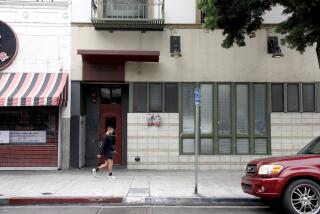Bradley Calls for Halt to Razing of Skid Row Hotels
Los Angeles Mayor Tom Bradley Tuesday proposed a one-year moratorium on demolition of old Skid Row hotels, which house thousands of poor people.
Bradley’s proposal to the City Council and the Planning Commission is counter to statements made Monday by some members of his Community Redevelopment Agency board, who spoke of dispersing the poor from Skid Row and who predicted that the area eventually would be occupied by commercial enterprises and industry.
Bradley also backed a six-month rent freeze for the single-room-occupancy hotels proposed by Councilman Robert Farrell.
Without these actions, the mayor said in a letter to the council, “I am convinced that the ranks of the homeless would swell dramatically.”
The action and the tone of the Bradley message differed sharply from sentiments expressed by the CRA board at a meeting Monday when some members cast doubt on the city’s ability to carry out a 1976 policy providing for housing for the poor on Skid Row. One board member suggested that the poor be dispersed throughout the county and another predicted that Skid Row will become a light industrial and commercial area.
The conflict pointed up a split between the CRA board, which has increasingly been siding with Skid Row-area commercial interests, and mayoral staff members and other officials who insist that inexpensive housing must be preserved.
The Skid Row-area business interests--fish processors, toy wholesalers and Little Tokyo property owners--favor commercial development of Skid Row, the last undeveloped portion of downtown--and have favored dispersal of the poor to other parts of the city and county.
Earlier in the year, Bradley sided with the Skid Row-area businesses when he enthusiastically backed the controversial police sweeps that wiped out sidewalks encampments of the homeless. But on Tuesday, the mayor, who had been criticized by some supporters for the sweeps, came out on the side of the poor.
Praises Rent Moratorium
He praised a proposal by Farrell, now awaiting a council vote, for a six-month moratorium, but said “more needs to be done.”
“From 8,000 to 10,000 units will be threatened in that area alone after the . . . (Farrell) moratorium expires in six months,” he said. More time is needed, the mayor said, to consider changes in zoning and other planning laws “to preserve threatened housing in the area and prevent intrusions into the area of incompatible uses.”
Barbara Zeidman of the Community Development Department, director of the city Rent Stabilization Division, said that six of the 80 single-room-occupancy hotels in the downtown area were demolished last year to make way for other businesses, eliminating housing for almost 500 people. Permits are pending for four more demolitions, she said.
In an apparent policy shift, Bradley said the City Planning Commission will have a large role in dealing with Skid Row issues. In the past, the CRA has been the main policy-setting agency for Skid Row, using its powers, including eminent domain, to rehabilitate Little Tokyo and to encourage commercial growth. It has also used CRA funds to preserve single-room-occupancy hotels in the area, but now fears that it can no longer afford massive preservation efforts.
Bradley asked that the commission be given the discretion to issue, or refuse, demolition permits, with appeals permitted to the City Council. And he proposed that the Planning Commission have the job of shaping the future of Skid Row by taking “complex planning actions which will affect the long-term preservation of . . . housing. . . . “
The commission is headed by attorney Dan Garcia, who on Monday reiterated his commitment to maintaining housing for the poor on Skid Row.
Disagree on Effect
Some city officials said they regard the mayor’s request as a victory for the Planning Commission and Garcia, who have disagreed with the CRA board and its chairman, labor leader Jim Wood, over a variety of issues. But Bradley’s chief of staff, Deputy Mayor Mike Gage, said he does not believe that there is a conflict between the two agencies.
Bradley also asked that property owners seeking demolition permits “guarantee construction of replacement units” within the downtown area.
No action was taken on Bradley’s proposals, or on Farrell’s housing-preservation measures.
But two council members, Ernani Bernardi and Zev Yaroslavsky, criticized the CRA board in exchanges with Deputy Mayor Grace Davis, a top mayoral aide on Skid Row issues. Davis had come to the council chambers to testify on the Farrell proposals.
Yaroslavsky, citing conflicts between Bradley’s proposal and the CRA board members’ comments, asked Davis, “Are you in a position to know what is the policy of the city and the administration of the city?”
Want to Keep Housing
Davis replied that the CRA has invested large amounts of money in saving single-room-occupancy hotels in the past and said “we are interested in preserving as much of the housing stock as possible.”
She said that if the city could not preserve housing stock on Skid Row, it would have to provide alternative housing. But, in words that are likely to upset Skid Row housing advocates, she added “it doesn’t have to be in Skid Row.”
More to Read
Sign up for Essential California
The most important California stories and recommendations in your inbox every morning.
You may occasionally receive promotional content from the Los Angeles Times.










